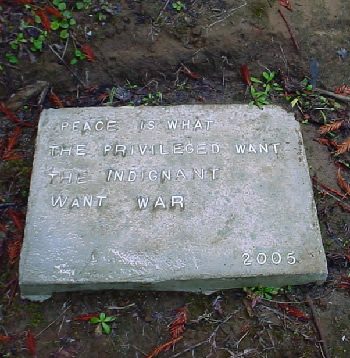Peace is what the privileged want. The indignant want war.

I consider myself privileged. Not because I am wealthy. I am not. Not because I have power to control others. I have no such power. I am privileged because I am not in pain, I am not disabled physically and I am not in financial need.
To be so blessed is privileged. And I want peace in order to preserve this good fortune and not lose this precious condition to the chaos of war. We who have the privilege of well being – we want peace.
Who wants war? Who are those motivated to do battle? Who can be mobilized into a fighting force? In what lies the motivations to fight? The motivation to join a battle unit.
Romance – to fight alongside comrades for a worthy cause.
Loyalty – to the leader as a matter of honor
Tradition – warrior father and brothers
Gain – remuneration, the spoils of war.
Anger – to wreak destruction on an unjust world.
Envy- to humiliate superiority
Retribution.
Vengeance.
Indignation for wrongs that must be righted.
Righteousness – to impose what is right.
The stepping stone’s words imply that peace is not a universal good. It benefits the privileged peaceful. But the indignant, seeing great wrongs in society, view war as good. They see it as necessary to oppose evil. Is it not a good to fight against wrong? Not everybody wants peace. There are always warriors among us. The poor and deprived need such champions.
Almost all the people of my acquiantance are, like myself, privileged. They report no pain, are physically functional and have sufficient finances to live in moderate well being. But, of these, many do not consider themselves privileged. Reactions to the stone inscription demonstrate it. They say,
“The ‘privileged’ don’t want peace. It’s the ‘privileged’ who want war. The rich and powerful finance and encourage war to protect their wealth and power. They take profit from conflict.”
These words are angry ones. They are the words of war. Who says such words considers himself a victim! The victim of those who are ‘privileged.’ Victims of oppression. Exactly from these emerge the indignant warriors among us. The ones ready to do battle to right wrongs. The ones who want war.
“Only the dead have seen the end of war,”
wrote George Santayana in his Soliloquies in England (1924)